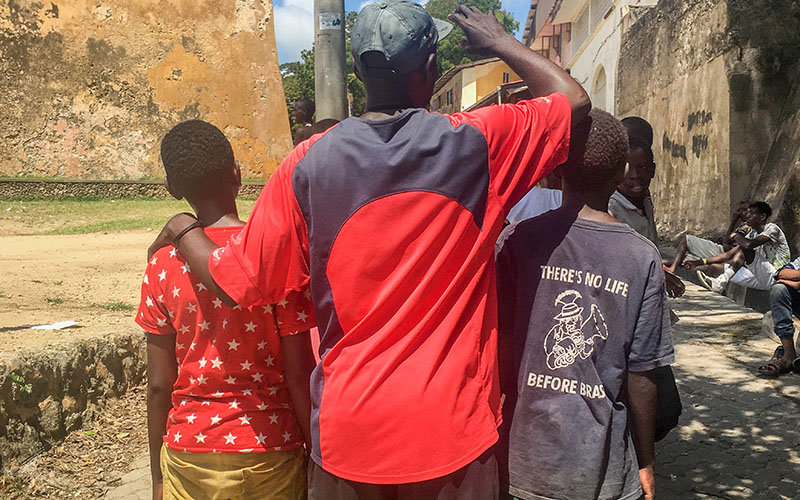Forging pathways for transformation through transnational knowledge exchange
Bolstering developmental outcomes on urban marginalisation and resilience of street- connected youth in a post-COVID-19 world.

16 February 2024
Image: Courtesy of Glad’s House Kenya
The project advances the PI’s research and collaborating partner, the Consortium for Street Children (CSC), interventions in South Asia and East Africa during the COVID-19 pandemic to improve the lives of street-connect youth. The COVID-19 pandemic and its policy responses exacerbated the everyday vulnerabilities of the street-based populations in the way its governance focused on dominant ideas of housing and social security in managing the pandemic.
The 3 key aims of the project are:
- Forging pathways for transforming lives of street-connected youth - the project aims to advocate for changes in public policy, welfare provision, and behaviours to assess the lived experiences of marginalisation (during and after COVID-19) and draw lessons from their demonstrations of resilience for favourable policy outcomes.
- Creating impact through transnational partnership - Multi-scalar partnerships across regional and transnational levels will be forged to share lessons from the Covid 19 response from the perspective of youth, NGOs, and policy makers, and develop a shared commitment to institutionalizing street-connected young people’s participation in policy decisions that address their immediate and ongoing needs in the ‘post-Covid 19’ world.
- Knowledge exchange for coproducing policy actions for advocacy - This project brings together multiple stakeholders locally, nationally and transnationally to produce a bottom-up perspective on vulnerabilities and challenge the dominant policy positions on poverty and vulnerability.
The project will involve academic partners like public universities, NGOs, CSC's South Asian and East African partners network members, representatives from street-connected communities, and key city, state, and national level policymakers. The project will involve a series of transnational multistakeholder deliberations, the production of policy recommendations, and the submission of the policy documentation to high-level forums based on CSC and the lead applicant’s ongoing engagements.
- Team
The Principal Investigator of the project is Paroj Banerjee who is a lecturer and co-programme leader of MSc Development Administration and Planning at the DPU. Paroj is an urban ethnographer and her research, pedagogy and public engagement activities focus on historical and emergent forms of urban dispossession and strategies for inclusion. Paroj has been leading multi-disciplinary research teams at an international levels and has been engaged in knowledge exchange activities to impact public policy and scholarship. She is in the core editorial board of an international peer-reviewed journal, City.
- Partner
The project is being conducted in partnership with the Consortium for Street Children (CSC) and its network partners the Child In Need Institute (CINI) in India, Glad’s House in Kenya and Grambangla Unnayan Committee (GUC) in Bangladesh.
Consortium for Street Children is a global network and advocacy platform dedicated to raising the voices of street-connected youth to transform their experience of the street and bring about long-term positive change so that they can access the rights they are afforded in the UN Convention on the Rights of the Child. It works with its network of 200+ NGOs, academics, governments, and the private sector to address the violation of street-connected children and youth’s rights from the streets to the corridors of power at local, national, and international levels. CSC has UN Economic and Social Council (ECOSOC) Special Consultative status and provides a global platform for street-connected children to be heard, and engages directly with the work of all bodies of the UN human rights architecture, including the Committee on the Rights of the Child and the Human Rights Council. CSC is the secretariat for the UK All-Party Parliamentary Group (APPG) on Street Children. CSC was instrumental in securing, and developing, the UN General Comment on the Rights of Children in Street Situations (2017) in partnership with the UN Committee on the Rights of the Child. Sian Wynne is leading the project from CSC.
- Outputs
Project partners from India, Kenya and Bangladesh, CSC and the PI conducted their initiation workshop where participants developed the methodology for regional workshops with street-connected youth. The framework drew from the long-term strategies outlined in UN General Comment 21 that are developed on the foundations of a rights-based approach and the key articles in the United Nations Convention on the Rights of the Child. While the framework made provisions for documenting the vulnerabilities faced by street-connected youth it also put in place strategies for documenting responses to address vulnerabilities.
 Close
Close

